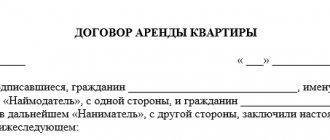How to divide a personal account in a privatized apartment? The need to answer this question arises when owners cannot decide among themselves who, how and when will pay for utilities. To avoid creating difficulties and conflicts, it is enough to separate personal accounts in a privatized apartment. This will allow the responsibilities of all owners to be accurately distributed. Here the question may arise: how to divide a non-privatized apartment? This situation makes little difference to the residents. The division of a non-privatized apartment, namely its accounts, will become the will not of citizens, but of the municipality.
Personal account – what are you?
This is a kind of “personal matter” of the apartment. Immediately after the house is put into operation, the apartment is assigned a set of numbers. This is your personal account number. This information is tied to the apartment until the very end of its operation, and does not change with the change of owner. The full name of the document that a citizen receives when requesting information about a personal account is “extract from a financial personal account.” For brevity, in the text we will call him FLS.
Like any personal file, the FLS contains all the information about the residential premises:
- What address is the house at?
- In what year of construction is the apartment located?
- On what floor is the apartment located?
- Is the house equipped with an elevator, garbage chute, etc.
- Does the apartment have water supply, sewerage, central heating, electricity, telephone and gas.
- Who has been registered at this address and since when, indicating the degree of relationship in relation to the responsible tenant.
- Who is the responsible tenant?
Writing an application to the Criminal Code
There is no strict form, so it is drawn up according to the general rules for drawing up business papers.
The application must contain the following items:
- Name of the organization to which the applicant is applying.
- Personal details of the applicant.
- Information about the owners of additional accounts.
- Information on the distribution of shares of the premises.
- Owner signatures.
Dividing bills in an apartment does not mean turning it into a communal apartment. In addition, this action does not entail a redistribution of shares between the owners; in relation to the real estate, each of them remains with their own interests.
Why are personal accounts separated?
Before the adoption of the new housing code, citizens had the opportunity to divide personal accounts - in fact, divide the living rooms of the apartment among themselves, and call the kitchen and bathroom common areas. As a result, everyone became the owner of their own separate piece of the apartment, and the apartment itself acquired the status of a communal one. After the changes in 2005 related to the introduction of the new Housing Code of the Russian Federation, it was decided not to create communal apartments. Citizens were deprived of the opportunity to physically divide an apartment into two separate living spaces. But in order to avoid communal conflicts, the possibility of nominal separation of personal accounts has been preserved. That is, in fact, each owner can allocate his share in the total mass of utilities and pay only for it. Out of habit, residents still call this procedure “separation of personal accounts,” but in fact this action is called “determining the procedure for paying for housing and communal services.” We'll talk about it today.
Reasons for the partition
Cases when residents may need to share a personal account in a privatized apartment are very different, but they can be divided into two groups.
First group : owners live together, but plan to pay separately.
Most often, the reason for this step is conflicts between residents, although there are exceptions.
Buying a new apartment is a rather difficult task for most citizens of our country, so many continue to live under the same roof, despite disagreements.
And since the budget still ceases to be common, the division of the personal account of a privatized apartment is quite logical and fair.
Typical situations of cohabitation of owners with separate accounts:
- Former spouses who have no other housing, and it will not appear in the near future;
- Parents and their adult children, who often start a family before they start their own apartment;
- One of the owners lived in another place for a long time (or, for example, served a sentence), and then decided to return.
Second group : one of the owners has not lived in the apartment for a long time, without deregistration, and other owners do not want to pay for it.
Typical situations are similar to the previous ones:
- After the spouses divorce, one remains to live in the apartment, and the other moves to a new place, while remaining the owner;
- Adult children have their own housing, but are registered in their parents’ apartment;
- The apartment was privatized by relatives, one or more of whom live elsewhere and do not pay for themselves.
If agreement between the owners is reached
Suppose you have a situation where the owners were able to come to an agreement that from now on everyone pays for themselves. All those who agreed are sane people, and are happily waiting for their separate receipt.
In accordance with Article 249 of the Civil Code of the Russian Federation, each participant in shared ownership is obliged, in proportion to his share, to participate in the payment of taxes, fees and other payments on common property, as well as in the costs of its maintenance and preservation. Part 2 of Article 247 of the Civil Code of the Russian Federation states that a participant in shared ownership has the right to be provided for his possession and use of a part of the common property commensurate with his share.
In accordance with Article 155 of the Housing Code of the Russian Federation, payment documents for making payments for residential premises and housing and communal services are provided to the owner of residential premises in an apartment building.
Considering the above, being the owner of a share of an apartment is a necessary and sufficient condition for filing an application for the redistribution of utility payments between the owners to the management organization.
The application from the owners can be either joint (one for all), or each one has their own.
The application must be accompanied by a document confirming ownership of the apartment. It must contain a list of owners with the size of their shares. Such a document is any contract of title for an apartment - a bill of sale, an agreement for shared participation in construction, a certificate of the right to inheritance by law, a donation, a privatization agreement. Usually, to confirm the entry into force of the concluded agreement, a certificate of state registration of the right is provided. The certificate confirms the fact of registration of property and also contains information about the owners and their shares. Of course, you must also have your identification document with you. Perhaps the management company will want to keep a copy of it.
Based on these documents, specialists from the management organization can calculate the share of payment of the total amount for each owner, and send separate receipts to each apartment owner, in proportion to the share that is in their property.
If the residents of your apartment building have chosen not a management company as a form of management, but a homeowners’ association, or direct management of the apartment building, then an application for division of receipts for each owner must be addressed to the chairman of the HOA or directly to the resource supply organization.
How to privatize an apartment with separate personal accounts?
A municipal apartment, the residents of which have divided the bills for paying for housing and communal services, can be privatized in the usual manner, since this does not affect the legal status of the housing.
If we are talking about different financial and personal accounts, then the apartment is communal, and it can be privatized in whole or in part. At the same time, the current residential complex allows citizens to become owners without the consent of their neighbors, but they can only privatize their own room. For more information on privatizing a room in a communal apartment, see here.
Common areas will remain common.
List of documents required for registration of ownership of the room:
- Statement on behalf of everyone registered in the room. Residents who refuse privatization in favor of other participants need to document their decision and have it certified by a notary;
- Certificate of registration at the place of residence (form No. 9);
- Cadastral passport and registration certificate of the room;
- Certificate of absence of debts on utility bills;
- Passports of privatization participants.
Having concluded a privatization agreement, you need to register ownership and register the property with the BTI.
If it was not possible to reach an agreement
Unfortunately, co-owners are not always inclined to resolve the issue peacefully. There are situations when one of the owners does not want to participate in the maintenance of their property. In accordance with Part 1 of Article 247 of the Civil Code of the Russian Federation, ownership and use of property in shared ownership is carried out by agreement of all its participants, and if agreement is not reached, in the manner established by the court. Thus, if the owners of the apartment cannot come to a common decision, or the management organization refused the application, the only way to determine the procedure for paying for housing and communal services is through the courts.
A lawsuit to determine the procedure for payment for housing and communal services is sent to the district court at the place of registration of the defendant.
Along with the claim, the following package of documents must be sent to the court office:
- A copy of an identity document (with the original, to confirm the authenticity of the copy);
- Title document for the apartment. For residential premises transferred into ownership before 2000 - the corresponding agreement and registration certificate of the technical inventory enterprise. For those apartments that were acquired after 2000 - an agreement and a certificate of state registration of ownership. Agreements can be of the following content: donation, purchase and sale, equity participation in construction, privatization. Also, instead of a contract, there may be a certificate of the right to inheritance by law or by will. You must provide this document - a copy and the original (to verify the authenticity of the copy);
- An extract from the Unified State Register of Real Estate, received as close as possible to the date of filing the claim in court. The extract establishes who is the owner of the apartment at the time of going to court;
- An extract from the financial personal account (which, among other things, contains information about debts for payment for housing and communal services);
- Information on the number of people living in this residential premises, indicating family relationships (certificate of family composition);
- Documents confirming compliance with the pre-trial procedure - appeals to other owners, which they received but ignored. If the management organization refuses you, then a copy of your application to it and its written refusal.
- Documents confirming independent payment of all bills by the plaintiff (receipts, checks);
- Technical passport issued for the disputed residential premises;
- Receipt for payment of the state fee for filing a statement of claim (300 rubles).
The hearing must be scheduled 30 days after filing the claim. The decision made will enter into legal force 10 days after its announcement. The defendant has the right to challenge the decision in a higher court within these ten days.
The statement of claim may be considered in the absence of the defendant. For example, if the other owner interferes with you and decides not to appear at court hearings. In this case, if he was properly notified of the time and place of the hearing (for example, by registered mail with notification), the court can legally consider the case in his absence.
As a rule, the court does not refuse to satisfy such claims. And the amount of payment for housing and communal services is divided in proportion to the share of each of the owners. There are judicial precedents when the owner, who does not live in the apartment, and pays utilities at the place of residence, reduces the share of payment in the disputed apartment.
After the decision enters into legal force, one of its certified copies must be sent to the management organization. The decision made is binding. Based on it, the management company will make the necessary calculations and organize separate receipts for each owner. If the Criminal Code continues to be in no hurry to execute the court decision, it is necessary to contact the Federal Bailiff Service to initiate enforcement proceedings.
Is it possible to split the cost of paying for housing and communal services?
Although the contract with the housing organization is concluded by one of the owners, all adult owners are required to pay the costs . Also, each of them has the right to be responsible for paying only their own expenses. You can split bills only in an apartment that is in shared ownership. If the property is joint, you will have to allocate shares.
How is this regulated by law?
In the Russian Federation, the procedure for dividing payments for housing and communal services bills has a strict legislative framework. In the law, the division of bills is called the allocation of a share in payment for housing and communal services and is regulated by articles 247 and 249 of the Civil Code and article 155 of the Housing Code.
The division of a personal account is carried out on the basis of Part 3 of Art. 31 LCD, clause 5, part 2, art. 153 ZhK, part 1 art. 158 LCD.
What happens after a court decision
After the court makes an appropriate decision, an agreement is concluded with each of the owners to pay for part of the living space and utilities.
All meters installed in the house are recognized as the common property of all owners. The owners of the apartment have a joint responsibility for timely prevention, verification, repair and replacement of metering devices. The transmission of information from metering devices will continue to be the responsibility of the owners. How the replacement and repair of failed equipment will be carried out must be determined by the owners themselves. From this moment on, each co-owner will receive a personalized receipt. This receipt usually indicates the full amount of payment and the size of the share established for each specific owner. The latter must calculate the amount to be paid independently.
With this approach, the debt of one of the payers will not affect those who regularly pay all their invoices.
Well, just in case, let’s mention that paying for utilities is the responsibility of the apartment owners. If there is only one owner, and there are more people registered in the apartment, the owner does not have the right to demand that registered citizens pay for part of the utilities, either personally or in court.
Vasilisa Ivanova
Restrictions
Disputes regarding payment for housing and communal services arise not only between the owners of the premises, but also between the owner of the premises and the residents registered in it. By law, the account can be issued exclusively to the owner of the square meters .
If, besides him, other persons are registered in the apartment, their payment for housing and communal services must be made on a voluntary basis. The allocation of accounts to citizens registered in the apartment, but having shares in it, is not provided for by the legislation of the Russian Federation.
Division is also impossible in an apartment registered as joint ownership..
In this situation, you will need to start with the procedure for allocating shares.
The owners of the premises should contact a notary office to draw up and sign an agreement on the allocation of shares.
The procedure is carried out in accordance with the regulations described in Article 16 of the Civil Code.
After signing the agreement on the allocation of shares, the owners of the premises must contact Rosreestr to obtain Certificates of ownership.
After receiving this document, the division procedure is carried out in the order described previously.
If it is not possible to achieve participation in the payment of housing and communal services by all owners of the premises on a voluntary basis, division of l / s is the most reasonable way out of the situation .
Each property owner will pay only his part of the services consumed, and the reasons for conflicts will disappear by themselves. We hope our article was useful to you.
How to open FLS
In order to open a personal account for an apartment, you will need the following documents:
- an application in the form established by the specific utility company;
- a document confirming the right to reside in the residential area;
- information regarding the number of people registered in the apartment;
- passport of the person in whose name the personal account is opened;
- power of attorney, if another person acts on behalf of the owner;
- other documents, depending on your life situation.
Documents must be provided in copies with the obligatory presentation of originals for verification. You need to contact the management company.
How to change owner
A change of personal account when changing the owner of an apartment must be done if the previous owner still has debts.
According to Article 153 of the Housing Code of the Russian Federation, the obligation to pay for utilities arises after purchasing an apartment, that is, after receiving documents on ownership. Accordingly, all housing and communal services debts that arose before this date (date of sale) must be paid by the previous owner.
If there is a debt of the former owner on the FLS when purchasing an apartment, then a new personal account is opened for the new owner of the property from the moment of registration of ownership of the residential premises.
A personal account for an apartment is opened upon application of the new owner. You must provide:
- an extract from the Unified State Register of Rights to Real Estate and Transactions with It or a certificate;
- document of purchase and sale;
- identification document of the person for whom the personal account is opened.
Re-registration (re-registration) of a personal account is necessary in the following cases:
- Changes in the personal data of the account holder.
- If there is no debt on the account from the previous owner. In this case, the data of the new owner is entered into the personal account and documents confirming this change are saved. The rest of the details remain the same.
The list of documents is similar to that indicated above. In addition, you will need to provide documents confirming the change of personal data, for example, a marriage certificate, a change of surname, etc.
Peaceful solution to the problem
If there are no disputes or mutual claims between the owners of the premises, then the procedure for dividing payments for housing and communal services will consist of the following stages:
- If the property is shared, then you should first convert it into shared property. This condition is most often established for spouses and requires contacting a notary office.
- Each owner applies to Rosreestr and receives an official certificate for his property for part of the premises indicating the size.
- At the next stage, the owners contact the utility service and provide a list of necessary documents: applications for division of the common account and the received certificate.
- At the final stage, utility services allocate a separate personal account to each applicant and send receipts for payment of charges separately, taking into account the size of each resident’s share.
At this point, the procedure is considered completed, and each citizen can pay incoming bills separately.








![Bank Zenit mortgage and refinancing [credit][sale]](https://bgrielt.ru/wp-content/uploads/bank-zenit-ipoteka-i-refinansirovanie-credit-sale4-330x140.jpg)